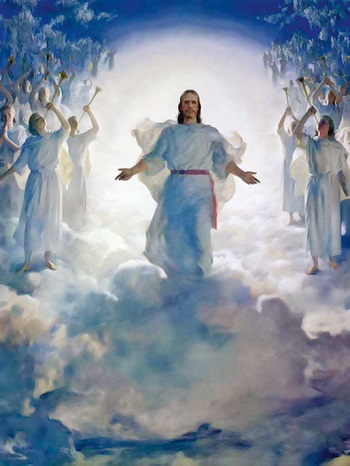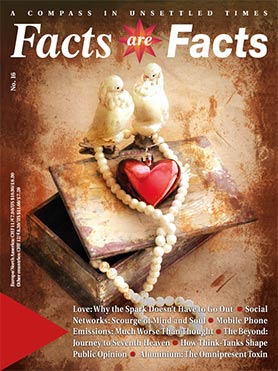Heaven or Hell? Your Inner Self Decides!
Some day, when we arrive in the Beyond, it won’t matter what appearance we presented to the outside world – all that matters is our inner wealth. In the second part of our report on the Beyond, we explore what to expect from the ‘Final Judgement’, the aspect of ‘marital’ coexistence, why we must go ‘back down’ to Earth, and why suicide is the worst offence of all. And after all that, come and join us on an unforgettable journey into the highest sphere of heaven!
When his wife gave the dying Johann Sebastian Bach a red rose, he told her: “Magdalena, where I am going, I will see more beautiful colours and hear the kind of music of which you and I have only dreamed. And mine eye shall behold the Lord himself.” As regards music and colours, the Baroque composer was perfectly right – though not so much about “beholding the Lord”. It is well known that those who have had near-death experiences report having been welcomed and accompanied by a shining being, yet in reality this being is an angel – not the “Lord himself” as they imagine. Thus we neither sit “to the right of God” (imagine the crush…), nor are personally judged by the Lord.

However, this does not mean that we should not take responsibility for how we live our lives. Many deceased people describe having a long conversation with experienced spirit beings who introduce themselves as ‘Angels of Judgement’. “During this conversation, one’s earthly life is processed and evaluated. The original life plan is compared to the Book of Life and the balance is settled. A decisive factor here is not one’s affiliation to a religious denomination or community, but one’s ethical mindset in earthly existence. The Angels of Judgement are not primarily concerned with addressing old weaknesses or the follies that we committed in life, but much more so with evidence of the spiritual values that we have either embodied or neglected,” writes Beat Imhof in his compendium Wie auf Erden so im Himmel – wie das Leben als Mensch das Leben im Jenseits bestimmt (“As on Earth so it is in Heaven – How Life on Earth Determines Life in the Beyond”).1
T. E. Lawrence (Lawrence of Arabia)2 reported a similar experience from the Beyond: “The ‘Judgement’ is real enough, but it is not entirely concerned with the results of sinning and suffering. What is weighed is the growth of being which experience has produced.”
One severely ill patient experienced a kind of divine court during a near-death experience: “Through large doors, I could see two long tables at which beings were sitting and talking – talking about me. I took mental stock of my life, aware of my guilt. It wasn’t a happy picture. The spirit beings at the table were busy with the same balance, but what worried me seemed little to concern them. All the usual sins that I had been warned of as a child were barely considered. However, there was serious concern over ‘crimes’ such as selfishness, self-centredness, stupidity. The word ‘waste’ kept being repeated – not in the sense of debauchery and profligacy, but the idea of squandering energy, talent, and opportunity.
On the other hand, the tiniest things were being praised – things that we all do from time to time without attaching any significance to them. The judges tried to determine the main features of my life. It seemed that I had been intended for a task that I did not fulfil. There had obviously been a plan for my life, which I had not grasped.”
W. T. Stead, an English journalist who went down with the Titanic, reported the following:
“On being established here, in the Real World, each one is interviewed by one of the Advanced Spirit Instructors and the whole record of earth is discussed and analysed. Reason, motive and result. The full and detailed record contains everything, there is nothing overlooked, and this is the time for paying the bill. Each is interviewed alone, and there is a minute analysis of all events, acts and thoughts. Then there is the making good to be gone through, the sum total to be paid ...for all our thoughtlessness and our unkind acts and words—all that have had direct results must be paid for.”
Working on Oneself
In the Beyond, man is confronted with what he has made of himself. His form reflects his innermost motivations, and his surroundings correspond to what lives within him: if he has allowed himself to rot spiritually in earthly life, he will find himself in a bleak wasteland; if all his motives, feelings and actions were extremely selfish and wicked, he will be encircled by the very same external darkness and dreadfulness that he brought about in his past earthly life. Yet at every level there is the chance to undergo catharsis and thus to climb into higher, lighter realms. In the case of some who have grown wicked, it may take what seems like aeons before they start to feel a voluntary desire for catharsis and improvement – yet whenever this does come, a helpful ‘spirit’ is present that enables the life-stream in question to embark upon the great work of catharsis.
Good people too need inner purification. Almost everyone brings with them the cinders and dark maelstroms that have arisen in their struggle through life and as a result of negative feelings. This accumulation of emotion, as well as prejudices, earthly dependencies, absurd beliefs and the like are also cleansed on the cathartic levels.
“When deceased people suffer in the Beyond, they suffer because of themselves – from their own guilty conscience, the realisation of their own wicked deeds, an awareness of weaknesses and failures brought about by their own selfishness, arrogance and dishonesty towards themselves and others. Over time, such bitter insights lead to heavy self-reproach, subsequent regret, and finally the need to make things right. This process can take several decades or even centuries by earthly time,” writes Beat Imhof. “For those whose transgressions in life were relatively minor, the realisation of what they had done, and the desire to atone for it, awakens at the same time. Here on this level, the deceased person encounters those with whom he has quarrelled, those whom he has treated unjustly, those to whom he lied, and those he deceived and from whom he stole. It is not a matter of revenge and retaliation, but rather forgiveness and conciliation. Without this, there is no release from suffering, as the law applies thus: those who do not learn will suffer. It is therefore important not to be unforgiving and resentful in this life. If we lay down our burdens here, they will not trouble us in the next life,” advises Imhof.

As lovely as the idea that every deceased Christian is personally welcomed by the Lord is, it is not true. Good people, however, are guided to the light by wonderful angels.
Only when the person has perfected himself in such a way that he no longer threatens to be a blemish on a higher, lighter sphere, may he take his place there.
Suicide – The Greatest Crime
All those who commit suicide are in for a nasty surprise: instead of being ‘snuffed out’, they continue to exist and often in an even worse condition. Anton Styger, a Swiss clairvoyant who has sent many unredeemed dead on Earth to their rightful places, believes that in the Beyond there is a differentiation as to how and why someone killed themselves. “Someone who took their life out of pure desperation or sheer helplessness will not be taken to the same level as someone who wanted to escape responsibility for a wicked deed.” However, reports from the Beyond sound similar: “I could feel that I lived on, only in a terrible delirium and in the most dreadful torment. To begin with, my vision was blurry; it was completely dark around me and I could barely collect my thoughts or make out anything in my surroundings. How long this hellish torment lasted, I don’t know. Perhaps it wasn’t long by earthly calculations, but as I was only able to measure time after what felt like endless suffering, it felt like an eternity.
Eventually, a merciful being came to me and took me under his wing. I later learned that he was one of the good spirits, who had made it his task to look after the unfortunates that had taken their own lives. He led me to an establishment where many more unfortunates were housed. I don’t know whether I should compare it to a hospital or mental institution, but it was certainly a place where all manner of sufferers were to be found.”
Almost all reports from the Beyond maintain that those who have carelessly thrown away the most precious gift of all – their earthly life – must remain in the dark spheres close to Earth until the time of what would have been their natural, originally planned death. Theosophist Erhard Bäzner describes it thus: “The suicide awakens in the lowest sphere of the astral world, which appears to him as a greyish-black colour. In the surrounding darkness, he can make out his own thought forms as colourful glowing images that nimbly dart around him like living persons in motion. As most suicides cannot tell whether these are real beings or apparitions, they are gripped by terrible fear at the sight. They had hoped to be rid of all obstacles and tribulations after death, and now it becomes clear to them that such things will only grow and proliferate from this time forth.” His further descriptions are so staggering that we do not wish to reproduce them here. The important thing to know, however, is that no one can escape themself – particularly not through death, as this does not exist – and that everyone shall awaken in the Beyond at the level that corresponds to their inner state. In the best case, the suicide will find himself unable to progress or grow until the time of their scheduled ‘natural’ death; in the worst case, they will suffer even worse torment than that which pushed them into their original state of despair.
It is possible to help these poor, confused souls by sending them “pure, elevated, selfless feelings, feelings of peace, harmony, love, and joy,” advises Erhard Bäzner. “These take the form of pure colours and shapes, encourage the radiation of higher vibrations and, so long as they are thought strongly enough, surround those to whom they are sent like guardian angels. We can also render the suicides great and valuable services during the night, when our physical body lies asleep and we elevate ourselves into the higher worlds.”
Love and Partnership
“The capacity for love is also not the same on all levels of the Beyond: it depends on the degree of spiritual development achieved. In the lower astral regions, the inhabitants still find themselves in a land of covetousness and deceit, which lead to all kinds of trials and tribulations.“ Contrary to this, “Love in the higher astral world is not passionate and self-indulgent, but controlled,” Imhof writes.
However, there is one thing that does not appear to exist in the Beyond: marriage in the earthly sense. This evidently belongs to the schoolroom of Earth, where we go to learn, to improve ourselves and pass the necessary exams set for us. Those who loved dearly and earnestly on Earth will also be brought back together in ‘heaven’ – if the vibrations of both beings allow this. If one of the couple has been dead for longer, for example, and has risen to a higher level in the Beyond, the two cannot live together until the second person has also reached the same level. In some partnerships, this never happens because their stages of development are so widely divergent, or because one of the two committed deeds on Earth that banish him or her to a gloomier astral field – until he or she embarks on the path of catharsis of their own accord.
Couples that separated unreconciled when they were still on Earth must try to make peace in the Beyond. Mutual anger and hatred can severely inhibit their upward and further development. In particular, oaths and execrations form fateful chains that must be broken in the world of the Beyond – and that is often no pleasant event! It is therefore very important that one partner forgive the other on Earth and also sends him or her forgiving thoughts after death.






